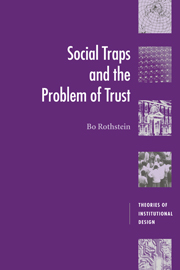Book contents
- Frontmatter
- Contents
- List of tables and figures
- Acknowledgements
- 1 Reflections after a long day in Moscow
- 2 On the rational choice of culture
- 3 On the theory and practice of social capital
- 4 Social capital in the social democratic welfare state
- 5 How is social capital produced?
- 6 The problem of institutional credibility
- 7 Trust and collective memories
- 8 The transition from mistrust to trust
- 9 The conditions of trust and the capacity for dialog
- Bibliography
- Index
8 - The transition from mistrust to trust
Published online by Cambridge University Press: 22 September 2009
- Frontmatter
- Contents
- List of tables and figures
- Acknowledgements
- 1 Reflections after a long day in Moscow
- 2 On the rational choice of culture
- 3 On the theory and practice of social capital
- 4 Social capital in the social democratic welfare state
- 5 How is social capital produced?
- 6 The problem of institutional credibility
- 7 Trust and collective memories
- 8 The transition from mistrust to trust
- 9 The conditions of trust and the capacity for dialog
- Bibliography
- Index
Summary
We are facing the following question: In concrete terms, what might be the process that the actors in a society undergo as they make the transition from deep mistrust to trust? That is, once we have ended up in a social trap, how do we get out of it? This has to do with how trust for other actors can be engendered and the legitimacy of public institutions. This is a core issue to be resolved, if societies and groups caught in social traps are not to remain there forever (also known as “steady states”). The problem is that these types of changes are both unusual and difficult to document. Why they are unusual should be apparent by this point. They are difficult to document because ultimately the process is a matter of changes of deep-seated mental or cognitive human beliefs. What might persuade the members of a group that have felt deep mistrust towards another group to start trusting those others? What must come about to make Catholics and Protestants in Northern Ireland, or Muslims, Serbs, and Croats in Bosnia, or Jews and Palestinians in the Middle East, ever change their beliefs about each other? What could make citizens in countries such as Russia and Argentina trust their governments to handle their taxes in a responsible way?
It is no easy task to find good empirical evidence in existing historical material to confirm how these changes in beliefs on who can be reasonably trusted occur.
- Type
- Chapter
- Information
- Social Traps and the Problem of Trust , pp. 167 - 200Publisher: Cambridge University PressPrint publication year: 2005

